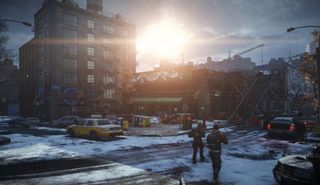
These are discussions I'm used to having with developers about singleplayer games, and for a second it's easy to forget that The Division is also a multiplayer game. The game's matchmaking system will, I'm told, assemble squads not solely based on level and ping times, but on preferences: if you play PvP a lot, you'll be matched with three other players who do that too.
There's a remarkable attention to detail here, from the obsessive use of playtesting metrics to refine map design and cover placement, to the insistence that before any member of the studio can work on a weapon they have to fire its real-world equivalent. Their work is the subject of meticulous iteration to ensure weapon balance is just right.
Iteration is an incredibly important part of any game development process, but traditionally it has always been a time-consuming one too. New features need designing, coding, adding to the next alpha build, and then testing; if any changes are required you have to go back to the start of the process.
Not any more. Snowdrop, Massive's new game engine, is enormously powerful, ticking all the next-gen graphical feature boxes – particles, smoke, cloth physics, volumetric this and HDR that – but it's hugely flexible, too. It's a live engine: the game has been playable since very early on in development, and any new features or fixes can be tested instantly. A couple of clicks, a cascade of command line windows, and you're in the game. It's greatly reducing development time, and therefore team sizes, too. Less than 300 people are working on The Division at the moment. While that will no doubt increase – this is a Ubisoft game, after all, and that vast global network of studios will surely help as release draws near – it's a very small team for such a big project, especially one that seeks to reinvent in so many areas. Resident Evil 6, you'll remember, was made by 600 people, and that didn't exactly help.

Yet Barnard's biggest personal goal isn't redefining online RPGs, or open-world storytelling, or PvP shooters. The problem he most wants to fix extends far beyond the bounds of a single game, and it goes a long way to explaining why he's staying tightlipped on a lot of The Division's finer details for now.
“I'm tired of games having a hook about them,” he says, “where you know how to play them and create everything before the game even comes out. I think it's better to give people a premise of the game and then have them discover what it's actually about when they play. I think that'll create community. I think that's gone in online games, it's dead; there's no interaction from players. I personally will want to say as little as possible before the game comes out so people will just play, and have a good time, and discover it.”
That's a noble goal – one that he'll do well to get past Ubisoft's marketing teams, but a noble one nonetheless. It's a goal that, together with a smart engine that greatly reduces the cost of game development, suggests that the next few years of games won't just be prettier, shinier and bigger. Nor will they simply iron out the mechanical kinks of the games that came before them. They might just have a positive effect on both the people who make games and those who play them, too.
The biggest gaming news, reviews and hardware deals
Keep up to date with the most important stories and the best deals, as picked by the PC Gamer team.
PC Gamer is the global authority on PC games—starting in 1993 with the magazine, and then in 2010 with this website you're currently reading. We have writers across the US, Canada, UK and Australia, who you can read about here.
Most Popular

